Uruguay loses China's citrus market, for now
Updated: 2014-03-24 05:58
By ELIANA KIRSHENBLAT in New York (China Daily Latin America)
|
|||||||||
Uruguay's biggest trading partner, China, has temporarily stopped accepting citrus shipments due to new phytosanitary regulations over fruit fly concerns. China now requires cold treatment of produce in transit, a common requirement for many countries accepting foreign imports, according to the US Department of Agriculture (USDA).
The USDA has accepted citrus from Uruguay since last year and requires cold treatment on all citrus from the country. Cold treatment, sometimes along with fumigation, is used to eradicate foreign pests like fruit flies which can multiply quickly under certain conditions.
Most imported fruits or vegetables that require cold treatment, which is simply sustained refrigeration at temperatures low enough to kill pests, undergo that treatment while in transit. However, imported fruits or vegetables may also undergo cold treatment at an approved cold treatment facility in either the country of origin or after arrival at their destination, as approved by the country of origin, in this case, China.
China is only the latest addition to the list of countries halting citrus shipments from Uruguay over pest control concerns.
Citrus advisor to the Ministry of Agriculture (MGAP), Federico Montes, said in an earlier statement that Uruguay's trade is also pending with Indonesia, the Philippines, India and Vietnam. "Asia, in general, has made significant changes, especially with regards to the fruit fly. All countries are asking for cold treatment in transit," he said.
He also expressed confidence in Uruguay's ability to fulfill these requirements. When upgrades on shipping vessels will be made has not been said, but MGAP hopes it will be able to resume shipping to Asia "within a year".
Uruguay had been hoping to expand to the Asian market since losing their generalized system of preferences (GSP) with Europe. Exports from Uruguay, especially citrus, have suddenly gotten more expensive for their old export destinations.
Though China has been accepting citrus from Uruguay without cold treatment requirements, the change reflects a growing trend of Asian countries, and China in particular, to step up standards on imported and exported agricultural products.
Arianne Perkins, spokesperson for the USDA, said in an interview with China Daily that the decision to allow a foreign country access to incoming food is based on years of checks ensuring that the product "is coming from a foreign source that has standards equivalent to treatment that would be found in the home country".
This was the basis for recently allowing China access to US-bound poultry, she said.
Perkins also said that China's poultry clearance was a process which took ten years, and before that Uruguay's bid to ship citrus to the US took 20 years to gain approval. A very sudden changing of standards is not a step that is taken lightly.
China also does a regular citrus trade with Australia and South Africa and has required cold treatment on all incoming citrus from those countries since 2010.
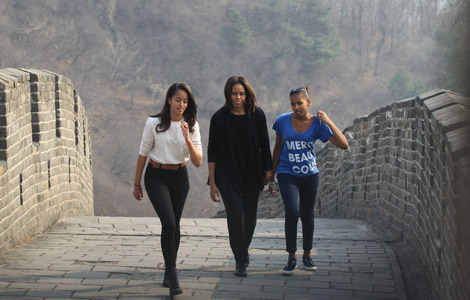
 Obamas climb Great Wall after lunch of trout
Obamas climb Great Wall after lunch of trout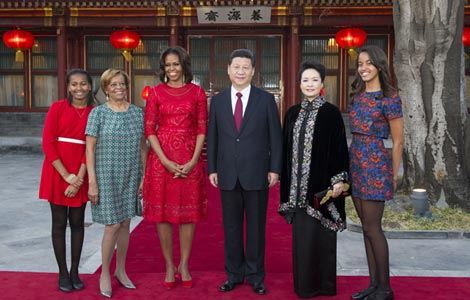
 US first lady shows character during maiden visit to China
US first lady shows character during maiden visit to China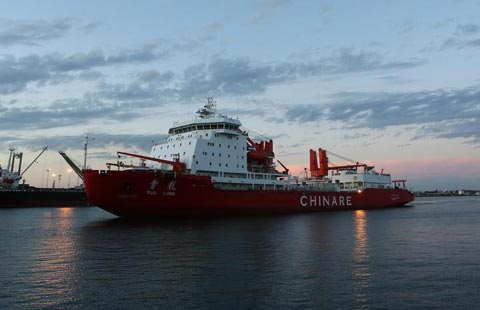
 Icebreaker heads for southern Indian Ocean for missing jet
Icebreaker heads for southern Indian Ocean for missing jet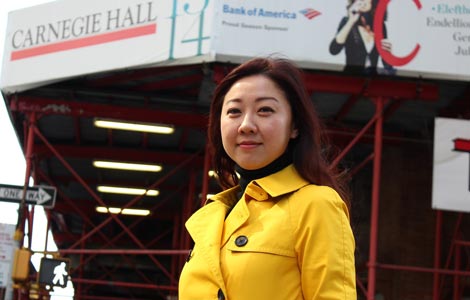
 A long musical journey to Carnegie Hall
A long musical journey to Carnegie Hall
 Balancing an egg on end during vernal equinox
Balancing an egg on end during vernal equinox
 Los Angeles County Air Show
Los Angeles County Air Show
 Don't need a bed to sleep tight
Don't need a bed to sleep tight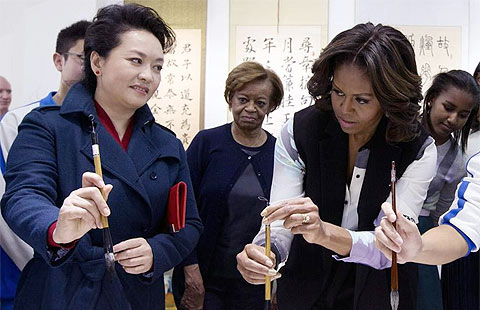
 Peng Liyuan meets with Michelle Obama
Peng Liyuan meets with Michelle Obama
Most Viewed
Editor's Picks

|

|

|

|

|

|
Today's Top News
Studying abroad remains vital ingredient of US foreign policy
Obamas climb Great Wall
First lady takes in some Peking Opera
Xi begins key Europe visit
US first lady shows character during visit
Xi sets off on first European tour
Beijing beefs up hunt for missing jet
China Southern announces Guangzhou-NY flight
US Weekly

|

|








